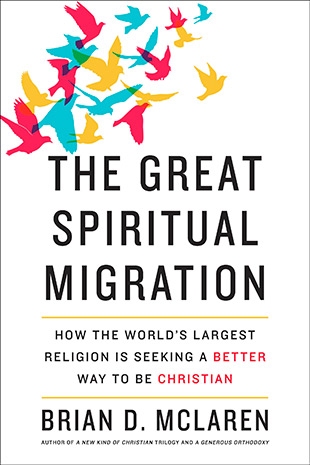Brian McLaren describes himself as a Christian thinker, a global activist, and a public theologian. His range of interests and commitments has been demonstrated in more than a dozen books. A former pastor with a background in literature, McLaren is an Auburn Senior Fellow and a board chair of Convergence. We have profiled him in the Living Spiritual Teachers Project.
In the first chapter of The Great Spiritual Migration, McLaren calls the Christian community to see themselves as "people in motion." The Bible is filled with stories of migration, and Jesus was "perpetually in motion" as he took his mission and message on the road.
Reading that, we were reminded of Mark Riddell's description of God in Godzone as "a Mover and Trailblazer, a Dancer and a Groundbreaker." All around us, everything alive is moving: "Novas explode, amoebas wiggle, winds stir, oceans heave, gazelles leap, ants scurry." They are all part of evolution. And, Riddell says, we are also moved by the Spirit who creates the winds of change. Every time an infant is born, a friendship is forged, a group of individuals are banded together to serve others —creation is going on! McLaren is right in sync with this understanding and that is why he calls us to conversion — or a radical rethinking of the nature and intent of our faith.
The first spiritual migration is moving "From a System of Beliefs to a Way of Life." Instead of being imprisoned or hunkered down in unchanging beliefs, it makes much more sense to focus on how we practice Jesus' way of love. McLaren gives us plenty of help. Each chapter ends with material for Contemplation, Conversation, and Action. We appreciated this action suggestion:
"Read 1 Corinthians 13 at least once per day. You may wish to record it, or to write it on a card that you place on your mirror, car dashboard, or computer screen. See what parts of the chapter speak most strongly to you and look for opportunities to put the chapter into practice."
McLaren heralds the growing number of churches that are making love their priority and developing curriculums of love to bring that goal to fruition. Now is the time for communities to express their love of God through care and compassion for neighbors, friends, strangers, and enemies. Schools of love seek out fresh ways of embedding love in rituals that enable human beings to flourish in body, mind, and spirit.
In a section on The Theological Migration, the author suggests moving "From a Violent God of Domination to a Nonviolent God of Liberation." That is followed by The Missional Migration "From Organized Religion to Organizing Religion." It is with a heavy heart that McLaren laments the toxins of supremacy, domination, and violence that have emanated from some sectors of Christianity. In its place, he envisions God 5.0 who will "lead us away from the precipice of cataclysmic war, save us from paralyzing polarization, and teach us to wisely revere and care for the earth upon which we all depend."
The migrations McLaren is suggesting are not only for one group of Christians. He admonishes progressives to set aside their criticism and complaints in regard to their conservative brothers and sisters and get moving together. With proper fanfare, he introduces a Charter for a Just and Generous Christianity. It is supplemented by "Fourteen Precepts of Just and Generous Christianity," covering such aspirations as humility, lifelong learning, gentleness, compassion, serenity, and communication.
As you read these documents, imagine that you have become "a social poet" using your spiritual faculties to bring peace, justice, and joy to a suffering and war-torn world. Work with new kinds of activism and open your heart and mind to the many possibilities available to you to serve others.
